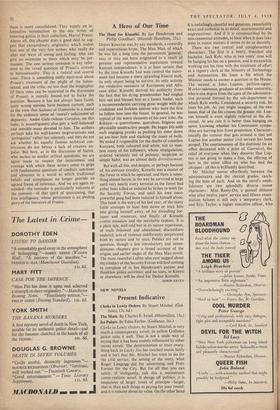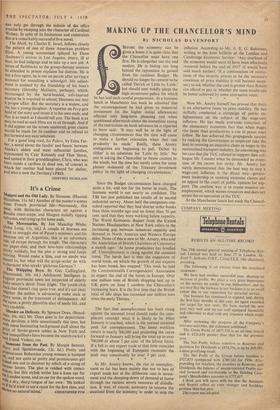NEW NOVELS
Present Indicative
Clerks in Lowly Orders, by Stuart Mitchel, is very much a contemporary novel; its yellow Gollancz jacket suits it well. That is not a snide way of saying that it has been unduly influenced by other recent novels. The determination to trace every- thing back to Lucky Jitn has touched mania lately and it isn't that Mr. Mitchel has tried to do for the civil service, the setting of the story, what Roger Longrigg did for advertising and Peter Forster for the City. But for all that you can safely, if inelegantly, call this a mainstream comic-realistic novel. It shrugs off politics; it is suspicious of larger issues of principle—larger, that is, than such things as paying for your round; and it is reticent about its value. On the other hand
it is unfailingly cheerful and generous, remarkably exact and authentic in its detail, unsentimental and unpretentious. And if it is circumscribed by its non-committal attitudes, at least when it does take sides in minor matters it seems to do so decently.
There are two central and complementary characters. The first is a beery, truculent old bachelor, Jack Ryle, who in two years' time will be hanging his hat on a pension, and is meanwhile working out his time with the minimum of effort as a registry clerk at the Ministry of Technology and Automation. He loses a file which the Minister needs to answer a question in the House. The second is John Lupton, petition-signer, Worker-salesman, graduate of an older university, who is one degree from the apex of the administra- tive pyramid formed by the sub-department in which Ryle works. Considered a security risk, he loses his job. As you might imagine, of the two losses that of the file creates the greater stir. Lup- ton himself is even slightly relieved at the dis- missal. At any rate it is better than hanging on never knowing whether his Communist sympa- thies are barring him from promotion. Character- istically the rumour that gets around is that not Lupton but another senior civil servant has been purged. The courteousness of the dismissal (in an office decorated with a print of Guernica), the relief of everyone when they discover that Lup- ton is not going to make a fuss, the offering of bets in the outer office on who has had the chopper : all this is brilliantly described.
Mr. Mitchel moves effortlessly between the administrative and the clerical grades, catch- ing the tone of each. And on the novel's estab- lishment are two splendidly diverse minor characters : Miss Remy-Ott, a genteel ditherer who after twelve years' service and fifteen exam- ination failures is still only a temporary clerk, and Eric Taylor, a higher executive officer, who can only get through the tedium of the office routine by escaping into the character of Cardinal Wolsey. In spite of its limitations and constraints this is a remarkably successful first novel.
The Mark, by Charles E. Israel, follows closely the pattern of one of those American problem films. A young accountant (played by Dana Andrews?) arrives in Los Angeles, jittery, ill at ease, to find lodgings and to take up a new job. A series of flashbacks to the group-therapy sessions he /attended in prison explains his distress. He is not a free agent, he is out on parole after serving a sentence for assaulting a schoolgirl. His adjust- ment is assisted by the friendship of his boss's secretary (Dorothy McGuire, perhaps), which, encouraged by the hard-headed, soft-hearted analyst he is required to attend, blossoms out into a proper affair. But the secretary is a widow, and She has a young daughter. A reporter on Peep gets hold of the story and twists it to his own ends; and that is as much as I should tell you. The book is as easy to read as such films are to sit through. And if It did appear on the screen unaltered, great claims Would be made for its candour and its refusal to MI forward any easy solutions.
For a good long read, Ice Palace, by Edna Fer- ber, a -novel about the feudin' and fussin' between Alaska's oldest and most influential families, represented by Czar Kennedy and Thor Storm, and united in their granddaughter, Chris, who was born inside a caribou (a dead one, of course) in Which her mother had been placed for shelter, and who is now the Territory's PRO.
GEOFFREY NICHOLSON























































 Previous page
Previous page